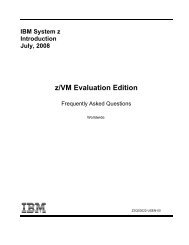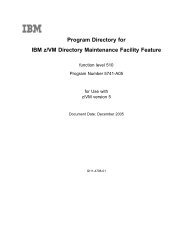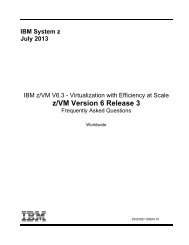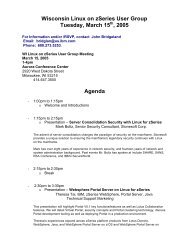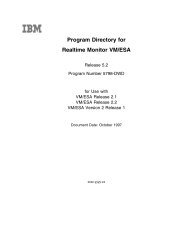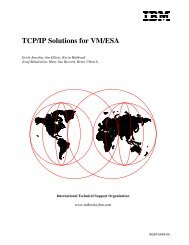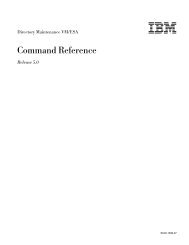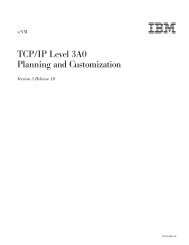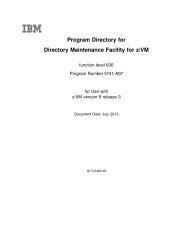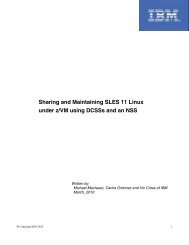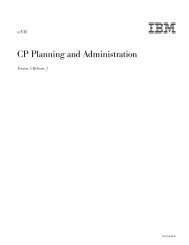- Page 1: z/VM TCP/IP Level 430 User’s Gu
- Page 4 and 5: Note: Before using this information
- Page 6 and 7: SUNIQUE . . . . . . . . . . . . . .
- Page 8 and 9: Syntax Rules for SBCS Translation T
- Page 10 and 11: Chapter 3, “Transferring Files Us
- Page 12 and 13: Understanding Syntax Diagrams This
- Page 14 and 15: Syntax Diagram Description Repeatab
- Page 16 and 17: ICMP Echo Request packets sent to I
- Page 18 and 19: Introduction Protocols are used to
- Page 22 and 23: TCP/IP Protocols and Functions to r
- Page 24 and 25: TCP/IP Protocols and Functions Simp
- Page 26 and 27: TCP/IP Protocols and Functions Dyna
- Page 28 and 29: TCP/IP Protocols and Functions Figu
- Page 30 and 31: 14 z/VM: TCP/IP User’s Guide
- Page 32 and 33: Transferring Files Using FTP FTP Co
- Page 34 and 35: Transferring Files Using FTP v Once
- Page 36 and 37: Transferring Files Using FTP CCONNT
- Page 38 and 39: Transferring Files Using FTP DCONNT
- Page 40 and 41: Transferring Files Using FTP LOADDB
- Page 42 and 43: FTP Subcommands FTP Subcommands The
- Page 44 and 45: | | | | FTP Subcommands Table 3. FT
- Page 46 and 47: FTP Subcommands >>>RMD gplsrv2:doc.
- Page 48 and 49: FTP Subcommands For example, when m
- Page 50 and 51: FTP Subcommands File Transfer Metho
- Page 52 and 53: FTP Subcommands TEST EXEC V 71 107
- Page 54 and 55: FTP Subcommands -rwx---rwx 1 MIKE -
- Page 56 and 57: FTP Subcommands 1. FTP operations c
- Page 58 and 59: FTP Subcommands Note: The ASCII sub
- Page 60 and 61: FTP Subcommands Examples CD COOK.19
- Page 62 and 63: FTP Subcommands CDUP Use the CDUP s
- Page 64 and 65: FTP Subcommands Operands The DELIMI
- Page 66 and 67: FTP Subcommands ►► EBcdic ►
- Page 68 and 69: FTP Subcommands Operands Usage Note
- Page 70 and 71:
FTP Subcommands ►► LCd director
- Page 72 and 73:
FTP Subcommands ►► LS name . ..
- Page 74 and 75:
FTP Subcommands MGET Use the MGET s
- Page 76 and 77:
FTP Subcommands ►► ▼ MPut loc
- Page 78 and 79:
| | | | | | | | | | | | | | | | | |
- Page 80 and 81:
FTP Subcommands v v variable-record
- Page 82 and 83:
FTP Subcommands ►► REName forei
- Page 84 and 85:
FTP Subcommands SITE Use the SITE s
- Page 86 and 87:
FTP Subcommands v v The SENDSITE su
- Page 88 and 89:
FTP Subcommands ►► SUnique ►
- Page 90 and 91:
FTP Subcommands TYPE Use the TYPE s
- Page 92 and 93:
Using FTP Within an EXEC Notes: 1.
- Page 94 and 95:
Using FTP Within an EXEC FTP Return
- Page 96 and 97:
FTP EXIT Return Codes Table 5. FTP
- Page 98 and 99:
FTP Reply Codes Table 6. FTP Reply
- Page 100 and 101:
84 z/VM: TCP/IP User’s Guide
- Page 102 and 103:
Transferring Files Using TFTP Creat
- Page 104 and 105:
TFTP Subcommands v v “REXMIT” o
- Page 106 and 107:
TFTP Subcommands v You can increase
- Page 108 and 109:
Sending and Receiving Electronic Ma
- Page 110 and 111:
Sending and Receiving Electronic Ma
- Page 112 and 113:
Sending and Receiving Electronic Ma
- Page 114 and 115:
Sending and Receiving Electronic Ma
- Page 116 and 117:
Sending and Receiving Electronic Ma
- Page 118 and 119:
TELNET Command Usage Notes TELNET F
- Page 120 and 121:
TELNET Subcommands ►► Brk ►
- Page 122 and 123:
106 z/VM: TCP/IP User’s Guide
- Page 124 and 125:
Monitoring the TCP/IP Network ►
- Page 126 and 127:
Monitoring the TCP/IP Network ARp i
- Page 128 and 129:
Monitoring the TCP/IP Network | | |
- Page 130 and 131:
Monitoring the TCP/IP Network Inter
- Page 132 and 133:
Monitoring the TCP/IP Network You c
- Page 134 and 135:
Monitoring the TCP/IP Network VM TC
- Page 136 and 137:
Monitoring the TCP/IP Network Note:
- Page 138 and 139:
Monitoring the TCP/IP Network | | |
- Page 140 and 141:
Monitoring the TCP/IP Network VM TC
- Page 142 and 143:
| Monitoring the TCP/IP Network OBE
- Page 144 and 145:
Monitoring the TCP/IP Network VM TC
- Page 146 and 147:
Monitoring the TCP/IP Network GATEW
- Page 148 and 149:
Monitoring the TCP/IP Network 132 z
- Page 150 and 151:
Authenticating Network Users with K
- Page 152 and 153:
Authenticating Network Users with K
- Page 154 and 155:
Authenticating Network Users with K
- Page 156 and 157:
Using NFS Commands NFS Client Comma
- Page 158 and 159:
MOUNT Command ►► MOUNT localopt
- Page 160 and 161:
MOUNT Command Userid=requester Spec
- Page 162 and 163:
MOUNT Command tablename The name of
- Page 164 and 165:
MOUNT Command Table 10. File Extens
- Page 166 and 167:
MOUNT Command MOUNTPW Command provi
- Page 168 and 169:
UMOUNT Command UMOUNT u/merlin/m Lo
- Page 170 and 171:
UMOUNT Command Table 12. NFS System
- Page 172 and 173:
UMOUNT Command information on the f
- Page 174 and 175:
UMOUNT Command Notes for Minidisk F
- Page 176 and 177:
UMOUNT Command SMSG Interface to VM
- Page 178 and 179:
SMSG Interface to VMNFS n send no r
- Page 180 and 181:
SMSG Interface to VMNFS Table 13. R
- Page 182 and 183:
SMSG Interface to VMNFS NFS Client
- Page 184 and 185:
Using NFS with RACF The following r
- Page 186 and 187:
Using REXEC Examples -l user_id Spe
- Page 188 and 189:
Using REXEC 2. Any machine used to
- Page 190 and 191:
Using REXEC 174 z/VM: TCP/IP User
- Page 192 and 193:
Remote Printing Commands Operands N
- Page 194 and 195:
Remote Printing Commands v v v v lp
- Page 196 and 197:
Remote Printing Commands filetype S
- Page 198 and 199:
Remote Printing Commands operations
- Page 200 and 201:
Remote Printing Commands you about
- Page 202 and 203:
Remote Printing Commands v v v v Be
- Page 204 and 205:
Remote Printing Commands Usage Note
- Page 206 and 207:
Remote Printing Commands system on
- Page 208 and 209:
Remote Printing Commands ►► LPQ
- Page 210 and 211:
Remote Printing Commands Examples P
- Page 212 and 213:
Using GDDMXD/VM device that is obta
- Page 214 and 215:
Using GDDMXD/VM target_server targe
- Page 216 and 217:
Using GDDMXD/VM GDDMXD/VM maps to t
- Page 218 and 219:
Using GDDMXD/VM ►► gddmx*XSync:
- Page 220 and 221:
Using GDDMXD/VM Compr The Compr opt
- Page 222 and 223:
Using GDDMXD/VM Newline The NewLine
- Page 224 and 225:
Using GDDMXD/VM 1. Use the sample p
- Page 226 and 227:
Using GDDMXD/VM 2 GDDM System Marke
- Page 228 and 229:
Using GDDMXD/VM 212 z/VM: TCP/IP Us
- Page 230 and 231:
Using SNMP SNMP/NetView Overview Fi
- Page 232 and 233:
Using SNMP SNMP GET Command 6 Missi
- Page 234 and 235:
Using SNMP SNM045I Major error code
- Page 236 and 237:
Using SNMP v snmp getnext 129.34.22
- Page 238 and 239:
Using SNMP SNMP TRAPSON Command The
- Page 240 and 241:
Using SNMP SNMP TRAPSOFF Command CL
- Page 242 and 243:
Using SNMP SNM045I Major error code
- Page 244 and 245:
Using SNMP v v 5 Illegal request 6
- Page 246 and 247:
230 z/VM: TCP/IP User’s Guide
- Page 248 and 249:
Using NDB The Client Machine 6. Whe
- Page 250 and 251:
Using NDB Portmap Manager Server Th
- Page 252 and 253:
Using NDB If an SQL call occurs bef
- Page 254 and 255:
Using NDB Format of Output Displaye
- Page 256 and 257:
Using NDB The your_program variable
- Page 258 and 259:
Using NDB 242 z/VM: TCP/IP User’s
- Page 260 and 261:
Using the Domain Name System * (roo
- Page 262 and 263:
Using the Domain Name System Nonaut
- Page 264 and 265:
Using the Domain Name System MB MG
- Page 266 and 267:
NSLOOKUP Command ►► NSLOOKUP
- Page 268 and 269:
NSLOOKUP Command Text that does not
- Page 270 and 271:
NSLOOKUP Command toolah wurrup.four
- Page 272 and 273:
NSLOOKUP Command [no]recurse retry=
- Page 274 and 275:
NSLOOKUP Command The following exam
- Page 276 and 277:
DIG Command v Query options on the
- Page 278 and 279:
DIG Command [no]addit [no]answer [n
- Page 280 and 281:
DIG Command [no]stats Specifies whe
- Page 282 and 283:
DIG Command 266 z/VM: TCP/IP User
- Page 284 and 285:
DIG Command The following examples
- Page 286 and 287:
DIG Command System: System: System:
- Page 288 and 289:
CMSRESOL Command Types of Queries n
- Page 290 and 291:
Types of Queries The stack contents
- Page 292 and 293:
Types of Queries 276 z/VM: TCP/IP U
- Page 294 and 295:
Using Translation Tables It is impo
- Page 296 and 297:
Using Translation Tables TCPXLATE b
- Page 298 and 299:
Using Translation Tables Notes: 1.
- Page 300 and 301:
Using Translation Tables The DBCS s
- Page 302 and 303:
Using Translation Tables ; ; Code P
- Page 304 and 305:
288 z/VM: TCP/IP User’s Guide
- Page 306 and 307:
Specifying Files and Data Sets OS/3
- Page 308 and 309:
Specifying Files and Data Sets AS/4
- Page 310 and 311:
NETRC DATA File REXEC searches the
- Page 312 and 313:
Mapping APL2 Character Set Values T
- Page 314 and 315:
Mapping APL2 Character Set Values T
- Page 316 and 317:
Mapping APL2 Character Set Values 3
- Page 318 and 319:
Using DBCS with FTP and Mail TYPE S
- Page 320 and 321:
Using DBCS with FTP and Mail User:
- Page 322 and 323:
Using DBCS with FTP and Mail DBCS c
- Page 324 and 325:
MIB Objects The encoding of an obje
- Page 326 and 327:
MIB Objects MIB/Network Elements Sy
- Page 328 and 329:
MIB Objects Table 22. Implementatio
- Page 330 and 331:
MIB Objects Table 23. Implementatio
- Page 332 and 333:
MIB Objects Table 23. Implementatio
- Page 334 and 335:
MIB Objects Table 25. Implementatio
- Page 336 and 337:
MIB Objects Table 25. Implementatio
- Page 338 and 339:
MIB Objects Table 25. Implementatio
- Page 340 and 341:
MIB Objects Table 27. Implementatio
- Page 342 and 343:
MIB Objects Table 28. Implementatio
- Page 344 and 345:
MIB Objects Table 30. Implementatio
- Page 346 and 347:
MIB Objects ibm3172ifLANCounters Ta
- Page 348 and 349:
MIB Objects Table 34. Implementatio
- Page 350 and 351:
MIB Objects 334 z/VM: TCP/IP User
- Page 352 and 353:
IBM 3172 Attribute Index Table 37.
- Page 354 and 355:
SNMP Generic TRAP Types Value Type
- Page 356 and 357:
RFCs RFC Title Author 1033 Domain A
- Page 358 and 359:
RFCs Government Systems, Inc. Attn:
- Page 360 and 361:
Abbreviations and Acronyms HIPPI Hi
- Page 362 and 363:
Abbreviations and Acronyms 346 z/VM
- Page 364 and 365:
Licensees of this program who wish
- Page 366 and 367:
350 z/VM: TCP/IP User’s Guide
- Page 368 and 369:
agent. As defined in the SNMP archi
- Page 370 and 371:
CCITT. Comite Consultatif Internati
- Page 372 and 373:
dotted-decimal notation. The syntac
- Page 374 and 375:
existing TCP/IP HYPERchannel networ
- Page 376 and 377:
LU-LU session. In SNA, a session be
- Page 378 and 379:
OS/2. Operating System/2. PDU. Prot
- Page 380 and 381:
Request For Comments (RFC). A serie
- Page 382 and 383:
subnetwork. Synonymous with subnet.
- Page 384 and 385:
X Window System. The X Window Syste
- Page 386 and 387:
z/VM: OpenExtensions Callable Servi
- Page 388 and 389:
372 z/VM: TCP/IP User’s Guide
- Page 390 and 391:
file names 289 file naming format,
- Page 392 and 393:
password use with FTP (continued) P
- Page 394 and 395:
378 z/VM: TCP/IP User’s Guide
- Page 396:
Readers’ Comments — We’d Like
- Page 399:
Spine information: z/VM TCP/IP Use




